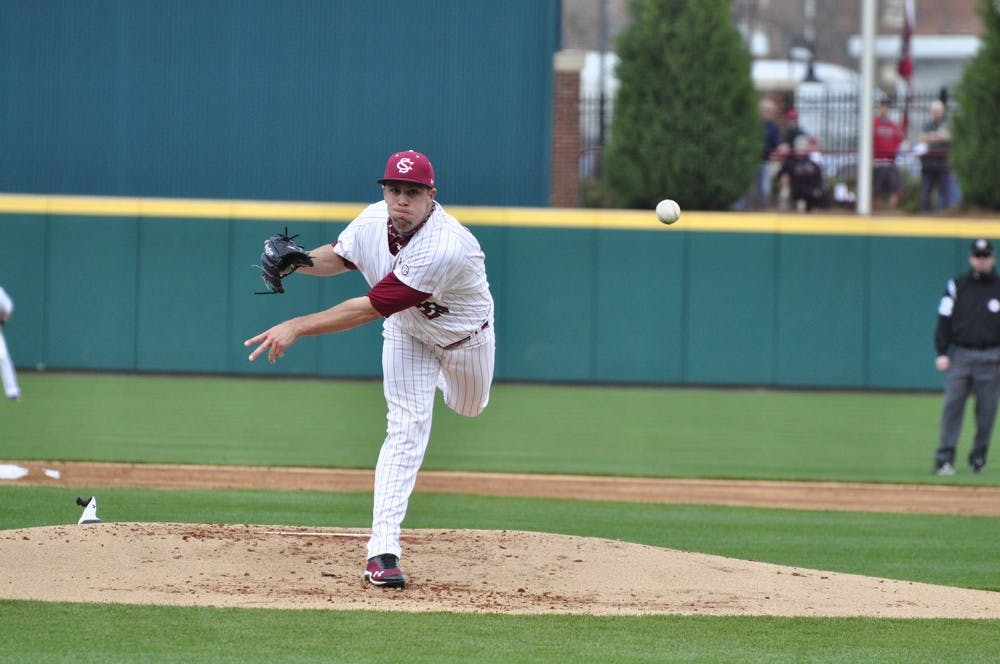Starter earns win in first MLB outing for Angels
When Angels pitcher Michael Roth was called up from AA Arkansas on April 13, the former Gamecock had little time to pack his things before heading to Los Angeles that night to pitch in relief against the Houston Astros.
“When I got the call-up I pretty much went from Dallas to L.A., and I didn’t have a suit on me,” Roth said. “So Albert (Pujols) gave me one of his suits to wear.”
As much time as Roth had to pack formal-wear for his first Major League road trip, the time he was allowed to adjust to life as a professional baseball player while still in the obscurity of the Minors was just as fleeting. The record holder for innings pitched in the College World Series spent just 27 innings in the Minor Leagues before he got his shot at the Bigs.
Roth serves as an example of what a college baseball career can do to develop a prospective Major Leaguer and the rapid path it can carve through the Minors. The Gamecock great sees his time in college as the reason he has been able to break through in the Majors.
“I didn’t really think professional baseball was going to be an option for me right out of high school,” Roth said.
While his rapid trip through the Minors is a rare case, Roth’s career path to this point has been no coincidence. He said his college career helped him develop some of the necessary intangibles to be successful in professional baseball while still an amateur, such as acclimation to large crowds high school prospects are thrust into upon turning pro.
South Carolina baseball coach Chad Holbrook served as recruiting coordinator and associate head coach for the Gamecocks from 2008 until being named head coach in 2012 and had a front-row seat for Roth’s entire career at USC.
“A year ago this time he was preparing to pitch against Alabama, and (Wednesday) he was pitching in the Big Leagues,” Holbrook said. “It’s an incredible story.”
Roth did not wait long to make a splash in the Major Leagues, earning a win in his first outing and striking out four batters in two innings of work. In the Majors, Roth has already compiled a 1-1 record in 8.2 total innings. His two decisions are just one shy of his 1-2 Minor League tally.
“It’s a good feeling to see a youngster take the ball for the first time and get out there,” Los Angeles manager Mike Scioscia said to Angels.com. “His makeup is off the charts. He got out there, competed and earned his first win.”
In the past month, Roth has seen consistent action as a reliever for Scioscia’s Angels and earned his first start Wednesday against the Texas Rangers.
Roth is not the only Gamecock who’s been thrust into Major League action this season. Jackie Bradley Jr. was a 2013 opening day starter for the Boston Red Sox and played in 12 games, earning three hits and three RBIs before being sent down to AAA Pawtucket upon David Ortiz’s return to health.
Prior to his stint in the Majors, Bradley Jr., who could not be reached for comment, earned the Red Sox organization’s Minor League Defensive Player of the Year award for his work in Single-A. His impressive 2013 Spring Training, along with his 2012 campaign in the Minors, allowed him to completely forgo time in AA and AAA before making his Major League debut.
As a coach in the Minors, Justin Tordi of the Charleston RiverDogs, a Single-A affiliate of the New York Yankees, has come across many young baseball players faced with the choice of whether to spend time in college or enter the Minors directly out of the high school ranks.
“As a player, you might think you have the tools that are really outstanding,” Tordi said. “But when they’re talking to some guys that have experience around the game, you could suggest to a kid, ‘Hey, a couple years in college or even going to (junior college) for a year or two would be beneficial for you.”
Tordi, a former Florida Gator, recognizes that some high school prospects come equipped with the ability to make waves in professional baseball without a college career, but he says he notices certain differences between the two paths a player can take.
“College guys, they come a little bit more polished,” Tordi said. “They can handle a little bit longer of a season coming into their first year of Minor League Baseball playing a 142-game set.”
College baseball’s eligibility rules are much different from the rules in basketball and football. A prospect can choose to enter a Minor League system upon high school graduation, but if he elects to enter the college ranks, the decision entails a 3-year commitment.
While players like Roth and Bradley Jr. have found success after an illustrious college career, many with experience in professional baseball still say the difference between the two possible paths is far from an exact science.
“Playing at South Carolina prepared me for a lot of things. Playing in Omaha prepared me to play in front of 25,000-plus fans and being in some of those pressure situations that I was as an amateur,” Roth said. “But for everybody it’s different. I think it just depends on who you are and what situation that you’re in.”

